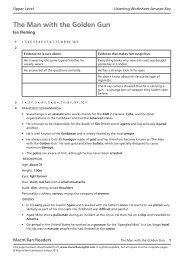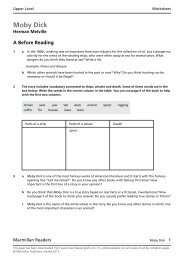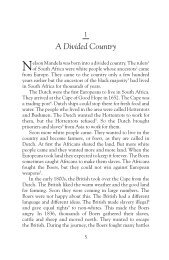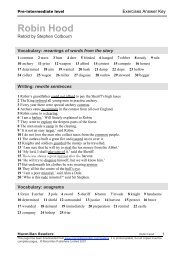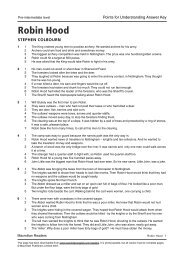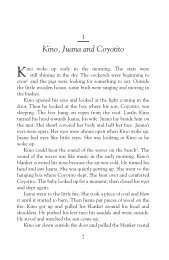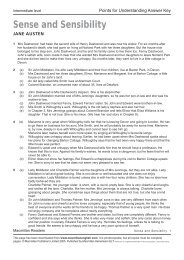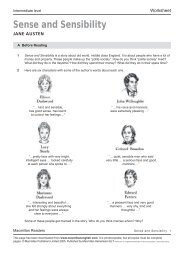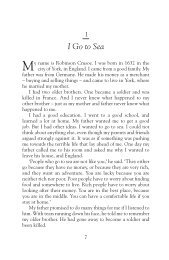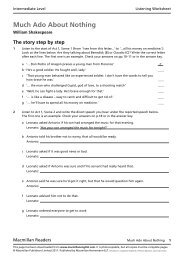Moby Dick Further Study Questions - Macmillan Readers
Moby Dick Further Study Questions - Macmillan Readers
Moby Dick Further Study Questions - Macmillan Readers
Create successful ePaper yourself
Turn your PDF publications into a flip-book with our unique Google optimized e-Paper software.
<strong>Further</strong> <strong>Study</strong> <strong>Questions</strong> Answer key Upper<br />
The crew of a whaling ship and their various tasks<br />
The crew of a whaling ship was made up of a number of different members. Some crew members were<br />
responsible for sailing the ship; some also rowed the smaller whaling boats. Each whaling boat had its<br />
own crew, with its own captain and a harpooner. There were carpenters to repair any damage to the<br />
boats and to build barrels to hold the oil as well as other wooden objects, and there were blacksmiths<br />
who made the harpoons and the other weapons. Although there were many levels of command – chief<br />
mates, second mates, third mates, and so on – the whole crew worked closely together, sharing the<br />
tasks and living together in very close quarters (close together). One of the most important tasks was<br />
that of the lookouts who climbed the ship’s masts to keep a lookout for whales. The same men who<br />
hunted the whales were responsible for collecting and storing the oil.<br />
2 Working on a whaling ship in the 19 th century<br />
This is a subjective question and there is no right or wrong answer. Here is an example of what you<br />
might write in answer to this question.<br />
It would have been a very hard life. Ships would set sail on three-year voyages, making only very<br />
brief stops to restock. Life onboard was uncomfortable and dangerous. Crews sailed in all kinds of<br />
conditions, and faced storms and pirates as well as the dangers of whaling. Men and whaling boats<br />
were often lost in the hunt and if you didn’t die in an accident there was the possibility of dying of a<br />
tropical disease. However, it could be very profitable if the whaling went well.<br />
revenge<br />
3 Ahab’s lust for revenge<br />
Do you think it is understandable for Ahab to want revenge?<br />
Considering the loss of his leg, it is possible to argue that Ahab’s desire for revenge on <strong>Moby</strong> <strong>Dick</strong> is<br />
understandable. However, whilst this may be a reason for his revenge, it is not an excuse. We would<br />
never consider the idea of revenge on an animal to be reasonable, as his lust for retribution is not<br />
justifiable or rational – even if <strong>Moby</strong> <strong>Dick</strong> were a human being, the fact is that Ahab has hunted him,<br />
several times, and that the whale is acting to defend itself, not to punish its hunters. Ahab himself<br />
does not explain the reasons for his feelings so we can only speculate as to his reasoning. Perhaps it is<br />
Ahab’s pride that has been wounded; Ahab tells Starbuck that he has been whaling for 40 years – we<br />
can speculate that this may be the first whale that had succeeded in fighting back?<br />
What price does Ahab pay for his revenge?<br />
His own death, the death of his crew and the sinking of his ship.<br />
What does Ahab’s obsession with <strong>Moby</strong> <strong>Dick</strong> tell us about the nature of revenge?<br />
That it is destructive and that we can never know what the consequences might be.<br />
<strong>Macmillan</strong> <strong>Readers</strong> <strong>Moby</strong> <strong>Dick</strong> 10<br />
This page has been downloaded from www.macmillanenglish.com. It is photocopiable, but all copies must be complete pages.<br />
© <strong>Macmillan</strong> Publishers Limited 2009. Published by <strong>Macmillan</strong> Heinemann ELT. Heinemann is a registered trademark of Pearson Education, used under licence.



